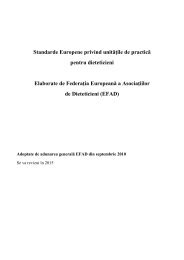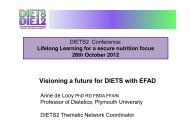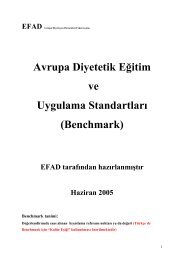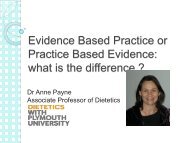European Dietetic Advanced Competences (EDAC) - Diets
European Dietetic Advanced Competences (EDAC) - Diets
European Dietetic Advanced Competences (EDAC) - Diets
Create successful ePaper yourself
Turn your PDF publications into a flip-book with our unique Google optimized e-Paper software.
DIETS WP2 (2012-07-05).<br />
Additional performance indicators for clinical dietitians<br />
g) Demonstrates autonomous practice and full accountability for the care of clients, in assessment, clinical<br />
reasoning, treatment and intervention by maintaining clear, accurate and timely records of practice (red)<br />
Competence<br />
Performance<br />
indicators<br />
5.0 Educator Skills<br />
5.1 Demonstrates responsibility to contribute to the education and training of patients/clients, students, dietitians, and<br />
other health professionals.<br />
5.2 Demonstrates ability to prepare and present educational material through the critical evaluation and synthesis of<br />
relevant information to meet learning outcomes in appropriate settings and using effective media.<br />
Knowledge, skills and application applicable to all field of dietetics<br />
a) Has an extensive knowledge and critical understanding of effective educational methods and pedagogy to<br />
influence the behaviour of individuals and groups, as well as students and other professionals<br />
b) Uses educational techniques to empower patients/clients, students, professionals and other people to identify<br />
their potential and seek out opportunities to improve nutritional health and reduce inequalities<br />
c) Ensures that individuals are encouraged and supported, wherever possible, to be self-sufficient in managing<br />
their own educational or health related needs<br />
d) Facilitates learning in practice, mentoring and coaching to promote a positive learning environment for students<br />
and other relevant professionals<br />
e) Able to perform a systematic literature review to critically appraise current evidence and synthesize an<br />
informed strategy, to teach best practice for a specific dietetic question<br />
f) Creates a culture of challenge and support where critical feedback is received positively and mistakes are<br />
regarded as learning opportunities<br />
g) Provides positive critical feedback, coaches team members to enhance their performance and clarify their roles<br />
and responsibilities<br />
h) Initiates, manages and demonstrates exemplary supervisory skills within dietetic practice and supports the<br />
development of supervision skills in others (students, colleagues and other professionals)<br />
12







